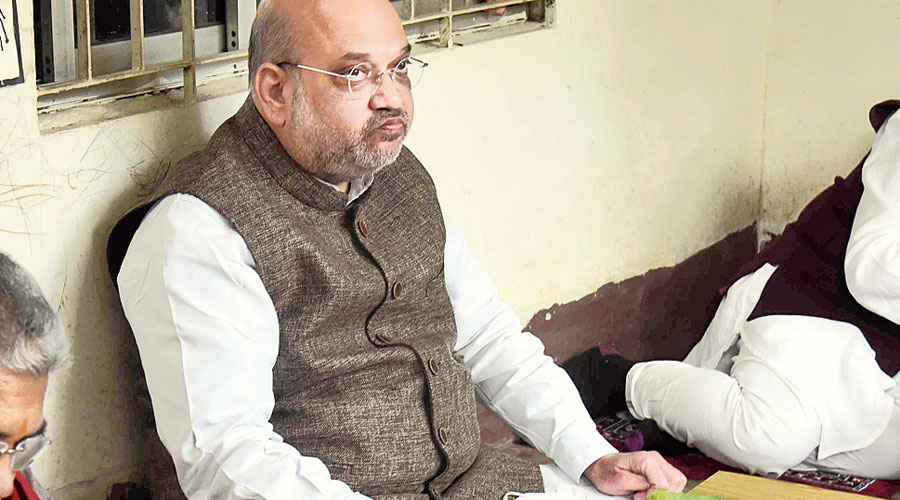Union home minister Amit Shah wrapped up his two-day Bengal visit on Sunday evening after launching the party’s campaign for next year’s Assembly polls.
A pledge to transform the state into “Sonar Bangla (Golden Bengal)”, if voted to power, was the recurring theme of his visit.
Shah spared no effort in attacking the Mamata Banerjee government. Accusing the government of many ills, from encouraging illegal infiltration from Bangladesh to pushing the Bengal economy into dire straits, he rolled out a long chargesheet during his two public speeches — one in Midnapore on Saturday and the other in Bolpur on Sunday — and a news conference before leaving.
Here are the highlights of what he said and the questions that were left unanswered:
Infiltration
What Shah said: On all the three occasions that he spoke during his 44-hour Bengal visit, Shah referred to illegal infiltration from Bangladesh and accused the Mamata Banerjee government of encouraging it as part of her “appeasement politics”.
Shah asked: “Do you think that the Trinamul government can bring an end to illegal infiltration from Bangladesh?”
Questions: The surprise was not in Shah broaching this issue — a divisive weapon in the saffron camp’s armoury. But there was a striking divergence from his pre-2019 speeches as he was silent on the Citizenship Amendment Act (CAA) and the National Register of Citizens (NRC) this time.
At the news conference, this correspondent asked him what had happened to the “chronology” he would often mention, saying the CAA would be implemented first and the NRC later rolled out across the country.
Shah said the CAA rules were yet to be framed because of the pandemic and that the process would start once vaccinations for Covid-19 began. On a nationwide NRC, he said, “Let the first step happen.”
Bengal economy
What Shah said: The biochemist who was called an alchemist after scripting the Uttar Pradesh success story of 2014 donned the hat of an economist at the news conference on Sunday.
He reeled off a wide variety of economic data — from Bengal’s slide on indicators such as per capita income to the lack of employment opportunities in the state — to buttress his claim that Bengal was on the path of decline. He said he was referring to the numbers as he wanted a discussion on the real issues before the Bengal polls.
Questions: The concerns Shah raised about the Bengal economy or the human development indices cannot be brushed under the carpet and there is little doubt that there is indeed scope for improvement. However, Shah was silent on the magic wand the BJP would use to turn Bengal’s economy around.
The Narendra Modi government also owes answers to questions such as why India’s per capita income is projected, according to the IMF, to slide below that of Bangladesh in 2020. Posers on why India recorded its highest unemployment rate — 6.1 per cent — in fiscal 2017-18 still remain unanswered by a government that came to power with the promise of “achchhe din”.
State farmers
What Shah said: He took care to explain that Bengal’s farmers were losing the benefit of the PM Kisan scheme — under which they get Rs 6,000 a year — because of the state government’s decision to stay out of the central scheme for political considerations. He said the decision flouted the principles of federalism.
Questions: There cannot be any argument that farmers in Bengal as well as the rest of the country deserve a better deal from the state and central governments. Shah, however, was evasive on questions about the farmers protesting outside Delhi seeking the repeal of three contentious laws that they believe will rob them of their land and livelihood.
‘Outsider’ tag
What Shah said: Shah was bitterly critical of the Trinamul for labelling the BJP “outsiders”. He reminded Mamata, who was in the Congress before floating Trinamul, that Indira Gandhi and other senior national Congress leaders used to come regularly to Bengal. Throwing the gauntlet at Mamata, he said the BJP leaders in Bengal did not need anyone from Delhi to obtain the seat of power in Bengal.
Questions: Most BJP leaders in Bengal concede in private that central leaders micromanage the affairs of the party.
The Bengal BJP’s Delhi dependence has also grown exponentially in recent months, with a clutch of leaders from other parts of the country having been dispatched to the state for the upcoming poll battle.
Nor can Shah deny that a series of gaffes — such as mentioning Visva-Bharati as Tagore’s birthplace — have offered Trinamul an opportunity to attach this tag.
Besides, the overzealous effort by the BJP’s central leaders —Shah said in Santiniketan on Monday that he would have been happy to spend seven days in Tagore’s abode — to prove their Bengali credentials have helped Trinamul keep the debate alive.
Dynasty and graft
What Shah said: One of the central themes of Shah’s attack on Mamata has been that her primary objective is to keep the chief minister’s chair warm for her nephew Abhishek Banerjee. “She doesn’t think about the 10 crore people of Bengal. Her only aim is to make her nephew the chief minister,” Shah said in Midnapore and Bolpur.
He accused the Trinamul government of spearheading corruption in Bengal before promising that the BJP, if voted to power, would rid the state of corruption.
Questions: The discourse on dynastic politics is an old one in India and Trinamul alone cannot be blamed for this trend. The BJP too has its share of dynasts — Anurag Thakur, Dushyant Singh, Poonam Mahajan, Pritam Munde, Pravesh Sahib Singh Verma and B.Y. Raghavendra all sit in the lower House of Parliament.
Besides, the latest addition to the saffron camp in Bengal, Suvendu Adhikari, hails from a political family that has four lawmakers.
The pledge of ridding Bengal of corruption sounds a little rich, considering that some of the BJP's converts from Trrinamul face multiple corruption charges.











